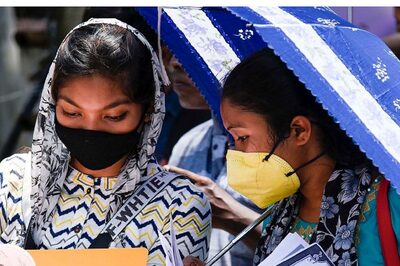
views
Bhubaneswar: In Odisha’s Nabarangpur, one of India’s poorest districts, an MLA of the state’s ruling Biju Janata Dal (BJD) was aghast to find last week that as many as 24 students of a residential girls’ school for the Scheduled Castes and Scheduled Tribes had not got the day’s lunch.
Only 58 students of the school’s total 268 were present that day, but meals were cooked only for 34 girls, found Dabugam MLA Manohar Randhari. After inspecting the hostel’s kitchen and speaking to teachers, he reported the matter to the district magistrate. Three teachers were placed under suspension.
While similar scenarios prevail in many schools in Odisha and the mid-day meal scheme is often badly managed, such action after surprise visits by the elected representatives or government officials is rare. But Chief Minister Naveen Patnaik now appears keen to bring about a positive change in the distribution of meals at government-run institutions.
Patnaik, who returned to power for a record fifth term in May, has instructed his ministers to make surprise visits to schools, hospitals, orphanages and Aahar centres for a reality check of the preparation and distribution of meals to the beneficiaries. The move is a part of his 5T initiative and Mo Sarkar programme.
Patnaik has also asked his Cabinet colleagues to have meals with the people there and to keep such visits secret. They have been asked to take with them no more than three or four persons. More importantly, the ministers will have to provide details of such random visits, along with their suggestions for improvement of services, in their monthly reports to the chief minister.
Teams of some of Odisha’s top bureaucrats, led by the chief minister's private secretary VK Pandian, had made whirlwind tours of government-run hospitals, Aahar centres and orphanages earlier this month to inspect the quality of public service being provided.
Pandian, a 2000-batch IAS officer known for reportedly having the chief minsiter's ears and eyes for years, and his high-level team were seen sharing lunch with the poor at an Aahar centre in Boudh district and then with the inmates of an orphanage in Keonjhar district.
Under the government’s Aahar Yojna, started in April 2015, cooked food is provided to the urban poor for lunch at a subsidised rate of Rs 5 per meal.
“All of us ministers will abide by the CM’s instruction, which is a very good move. This will cause improvements in the delivery of public services across the state,” said school and mass education minister Samir Ranjan Das.
Health minister Naba Kishore Das said such surprise visits will bring greater transparency at all levels of administration in districts. “The people of Odisha have voted the BJD to power. So the CM is taking these steps to pay back the debts of the people,” he said.
“When ministers visit the Aahar centres and share meals with us, they will get to know how the quantity of food is low and often the poor return without getting food. I hope these visits will improve the service,” said Santosh Kumar Dandsena, a daily-wager in Balangir who takes his meals at an Aahar centre.
Raj Kishore Mishra, former state advisor to the Supreme Court-appointed commission for food security, welcomed the surprise visits but said the functioning of mid-day meals scheme at schools would improve only if elected panchayat representatives, such as sarpanches and ward members, were made accountable for this scheme.
“Recent visits to hospitals by the Pandian-led team of bureaucrats have already brought about positive changes among hospital staff across Odisha. The staff have not only become punctual, they are also taking extra care in attending to patients,” said senior journalist Rabi Das.




















Comments
0 comment